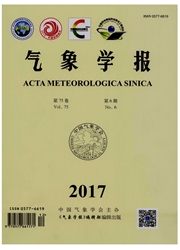

 中文摘要:
中文摘要:
以中国气象科学研究院灾害天气国家重点实验室的车载C波段双线偏振多普勒雷达(CPDRW)2011年完成升级改造后观测的一次大范围层状云降水过程资料为例,讨论了该设备改造后探测资料质量的改进情况及其对降水粒子的探测性能,同时利用模糊逻辑法结合地物的常规特性和偏振特性,建立了一种运用双线偏振雷达观测资料识别地物及地物与降水混合回波的方法,并利用该雷达的观测资料对识别结果进行了分析检验,最后统计分析了降水回波的差分反射率因子(ZDR)、零滞后互相关系数(PHv(O))与信噪比的关系,以及系统初始相位的稳定性及降水资料的一致性。分析结果表明,在常规参量的基础上添加偏振参量并采用模糊逻辑法构建的综合识别模式和常规识别模式都能较好地识别地物,但综合识别模式明显改善了常规识别模式0速度区过度识别的问题,且在地物与降水回波混合的情况下叠加混合回波识别模式具有更加明显的优势。雷达改造前,ZDR及PHV(0)在信噪比小于25dB时受噪声影响很大,测量值存在较大误差,资料变得不可信;通过这次的升级改造,其信噪比探测阈值由25dB降低到15dB。系统初始相位比改造前更加稳定,随仰角和时间的波动性更小。利用垂直扫描数据进行系统误差订正后的ZDR资料能较好地反映降水粒子的实际情况,ZDR随信噪比的变化较之改造前更加平稳,而对差传播相移中ФDP进行分类处理后拟合的差传播相移率KDP资料也与实际情况一致。
 英文摘要:
英文摘要:
Based on the large area stratus precipitation observation in 2011 by the upgraded C-band dual-linear polarimetric Doppler radar on wheel (CPDRW) which was built in the State Key Laboratory of Severe Weather (LaSW), Chinese Academy of Meteorological Sciences (CAMS), the improvement of radar's measurement quality and its detection ability are discussed. The dependencies of the differential reflectivity ZDR and the cross-correlation coefficient pHv (0) on the signal-to-noise ratio SNR, and the stability of the radar system initial differential phase are analyzed. After radar upgrade, the detectable threshold of SNR for ZDR and pHv(0) is improved to 15 dB from 25 dB. Moreover, the system initial differential phase is more stable and its volatility with the elevation angle and the time becomes smaller, and ZDR becomes more steady with the change of SNR as well. The calibration of ZDR by using the vertical incidence method is conducted and improved. The specific differential phase KDp calculated from the differential propagation phase shift ФDP processed using the classification processing method becomes smoother and more reliable. According to the conventional characteristic and the polarization properties of ground clutter, the ground clutter and mixed echo detection algorithm is developed by using the fuzzy logic method. The detection performance of the algorithm is evaluated. The results of analysis indicate that both the comprehensive detection algorithm which combines regular parameters with polarization parameters and the conventional detection algorithm can identify ground clutter well, but the comprehensive recognition algorithm has more obvious advantage in the classification of echoes near the zero radial velocity area and the case of mixture of ground clutter with precipitation echoes than the conventional recognition algorithm.
 同期刊论文项目
同期刊论文项目
 同项目期刊论文
同项目期刊论文
 期刊信息
期刊信息
